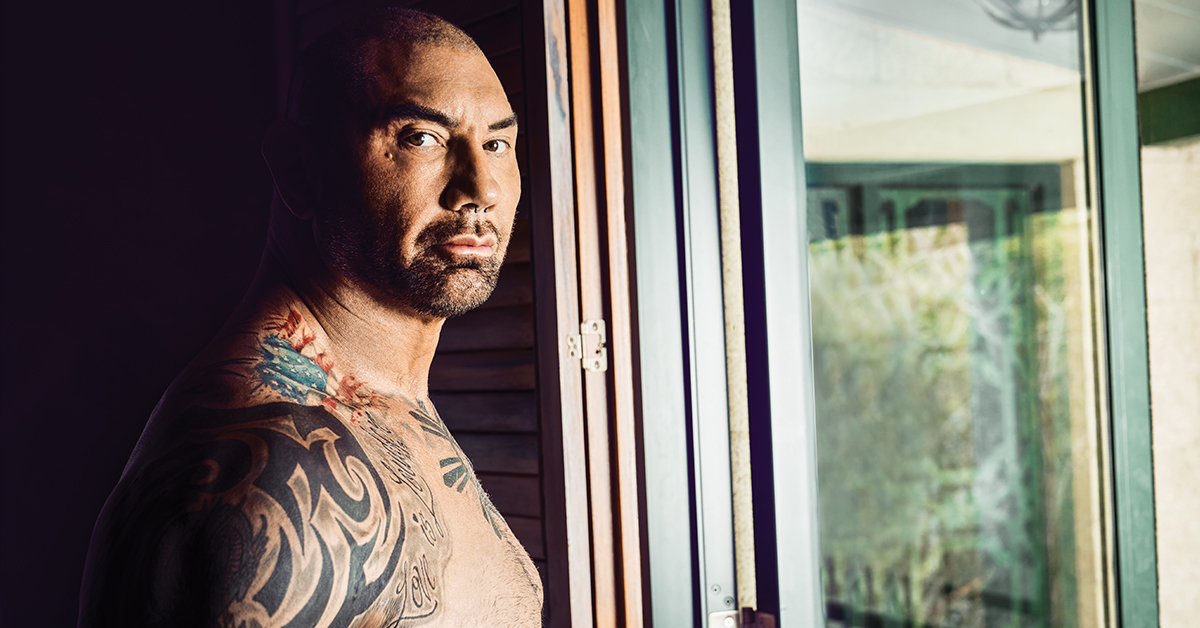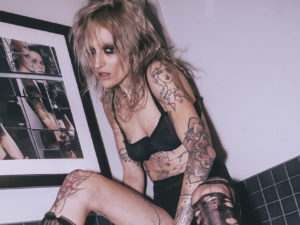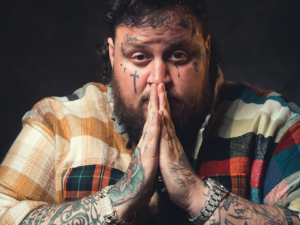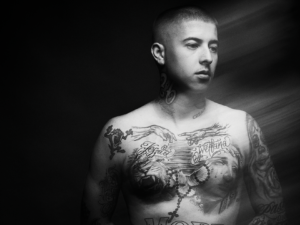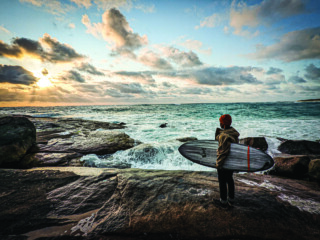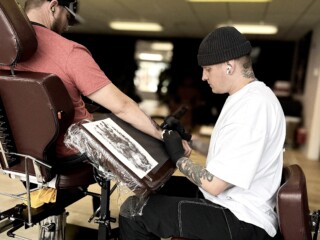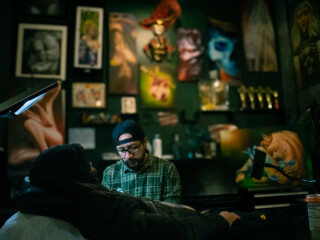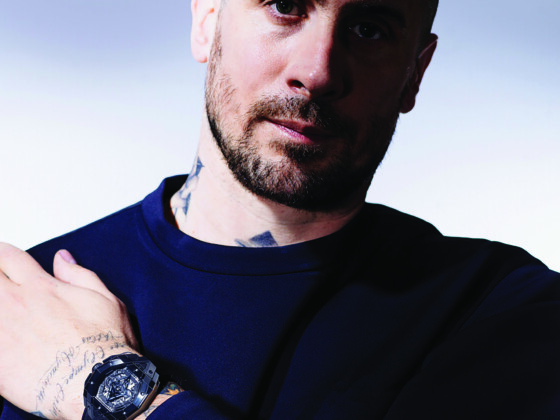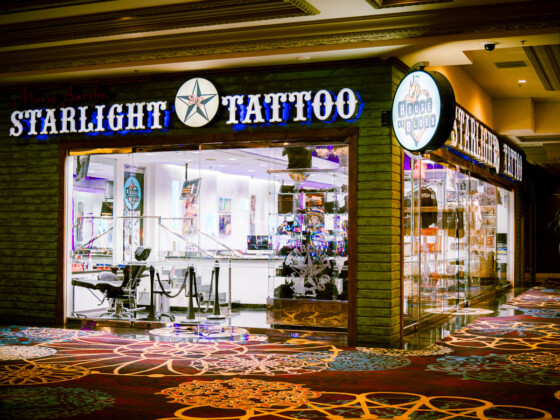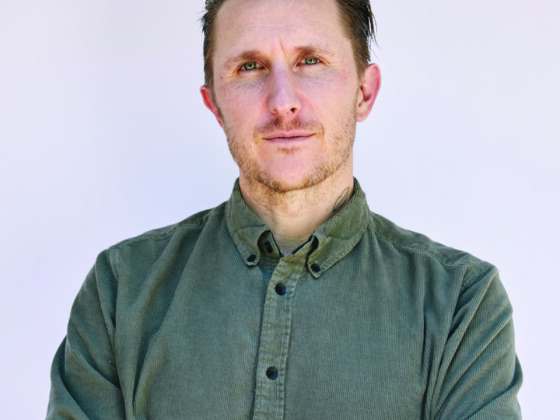Charlie Connell
May 21st, 2021
Dream Chaser
Dave Bautista spent much of his childhood in front of the TV, dreaming about a better life. His drive to chase those dreams has led him from working as a bouncer to main-eventing Wrestlemania to starring in Hollywood blockbusters. And he doesn't plan on stopping that chase any time soon.
Photos by Mark DeLong
Growing up in an impoverished corner of Washington, D.C. during the 1970s, Dave Bautista didn’t see a lot of hope in his environment. His family didn’t have much, and they were completely surrounded by the specter of crime and violence in their neighborhood. But they had a television, and for young Dave, that was enough to fuel his dreams.
“I was an odd little kid who just loved movies,” Bautista recalls. “I needed something to inspire me when I was a child. I would look around at my circumstances and my living conditions, and there was nothing there. But I could watch TV or watch a movie and it would make me feel a certain way… it was incredible.”
As he spent hours watching average schmos like Luke Skywalker and Rocky Balboa rise up to become heroes on the small screen, it filled Bautista with ambition, giving him the drive to never stop chasing the dreams he had in his head. It wasn’t that he caught the acting bug; that wouldn’t come until later. Instead, the films he watched embedded a deep love of storytelling within his mind.
To the untrained eye, professional wrestling appears to be a primarily physical endeavor. Sure, the combatants pick up a microphone on occasion to berate their opponent, but you mostly just see people getting thrown around the ring. In reality, each match is carefully outlined to build ongoing storylines, but not too orchestrated due to the need to improvise based on how the crowd reacts. For Baustista, his run in the WWE was the best acting school on Earth.
“I love professional wrestling because, to me, it was like theater,” he explains. “Once I learned to be flexible and go with the crowd—what their energy was, what they were liking, what they weren’t liking—it became an art. It became a living performance arc.”
Dave Bautista brought an imposing physical presence with him from the moment he first stepped into the ring, but it took years for him to mold himself into a complete performer. Hitting an opponent with a Batista Bomb came naturally. Getting on the mic… not so much.
“It was my biggest fear,” Bautista recalls. “It was awful. I mean, I loved it, but it was terrifying to me. As I grew as a wrestler I found ways to deal with my fears.” One way he did this was by going off script. Instead of trying to memorize every line he would give himself bullet points and try to have a conversation with the audience. “Once it became more organic, I grew into that guy,” he continues. “I became a guy who could get across just verbally, it didn’t always have to be the physical presence. It’s the same with film. The more I act, the more actors I work with, I become a stronger performer and I lose my inhibitions.”
Throughout his still-fledgling acting career—remember, he didn’t really start until he was in his 40s—Dave Bautista has shown a fair amount of range as an actor. This is not just a testament to his skill, but also the byproduct of a discerning hand in choosing projects.

“When I first came into films people obviously wanted to cast me as an action guy, coming from a professional wrestling background,” he says, “and I knew what that meant. I knew I was going to be typecast, I knew I was going to be stuck into certain types of films that didn’t really lead anywhere. I really fell in love with acting and I wanted people to offer me those roles that required a bit of range.”
He’s acted in a broad range of films, among them a neo-noir thriller (“Hotel Artemis”), a family film (“My Spy”), a straightforward action film (“Marauders”) and a buddy comedy (“Stuber”). Even in the roles where he’s been clearly typecast, like his star-turn in 2014’s “Guardians of the Galaxy,” Bautista’s hilarious performance as Drax the Destroyer shows he’s much more than just a big tough. “You would think that me being in a Marvel film and me looking like a human gorilla that Drax would be just a badass character,” he laughs, “but he gets his ass kicked more than any other character in the Marvel Universe.”
It wasn’t until his most recent film, the upcoming Zach Snyder-directed “Army of the Dead,” where his acting career started clicking on all cylinders. The film is a self-aware piece of genre fiction depicting a group of mercenaries conducting a heist in Las Vegas during a zombie apocalypse. Following in the footsteps of the original zombie master, George Romero, the writers behind “Army of the Dead” crafted a fully fleshed character (pun intended) when they wrote Bautista’s role of Scott Ward.
“Throughout my career I’ve had moments where I could show off this part of my range or that part of my range, but I’ve never had a film where I could put it all out there and showcase my range as an actor,” Dave Bautista says. “There are tons of emotional beats, I finally get to be a legit badass in this film. There are moments where I get to be eyebrows-up sarcastic. I get to really express myself as a performer, with everything from A to Z as a range. I really haven’t been able to do that in any film.
“I get to be a leading man,” he continues. “I went the long route [to get here] for sure, but I feel like just now I’m getting offered lead roles. I want people to take me seriously as an actor and with this film I’m getting to where I want to be.”
It may have taken a bit of a chase, but Bautista is realizing his dream of becoming a lead actor. While the films may be a little different than the ones Gary Cooper starred in, there is one place where Bautista feels particularly akin to legends like Cooper—on his Harley.
He first became enamored with motorcycles back in D.C. all those years ago. He took to riding like a duck to water. Not only did he get a rush from the power of the machine and the adrenaline high of opening it up on a straightaway, but after learning to drive stick on a ’72 Volkswagen, he already understood the mechanics. Over the years, the passion would wax and wane, but it came back in a big way after being invited to a group ride with MMA fighter Cowboy Cerrone.

“I met [Cerrone] at a concert and was like, ‘Man, I really miss riding,’” he recalls. “He goes, ‘Come on by the ranch. I got a bunch of bikes, jump on one, we’ll go for a ride.’ We had a bunch of guys, just a bunch of fighters, and we all just jumped on a bike and took off, like a bunch of modern-day cowboys.
“When I watch a movie scene and I see a cowboy riding off into the sunset,” he continues, “that’s a happy ending. That’s the feeling I get from being on my bike.”
Riding is more than a hobby for Dave Bautista, it’s a way for him to keep centered. Riding requires periods of intense focus—when navigating through clogged city streets filled with drivers oblivious to motorcycles, for example. But that all changes on the open road. “[Riding] becomes very Zen, very relaxing, once you get somewhere where you aren’t even shifting anymore, you’re just riding,” he says. “You’re enjoying the Earth, enjoying the weather, enjoying the day, enjoying being alive. There’s something very freeing about it.”
Long before Dave Bautista experienced the pleasures of becoming a biker himself, he visited a biker to get his very first tattoo. As an 18-year-old kid, he walked into “an old redneck biker tattoo shop” looking for ink. There he met an affable biker who did everything he could to talk Bautista out of placing it where he did. “I didn’t want my dad to see it, so I got this tattoo on my ass,” he laughs. “It was a cement-looking heart and it said ‘Heart of Stone.’ I thought it was so tough. He got ready, shaved the little hairs on my butt, then he rolls his stool up to my head and goes, ‘Man, are you sure you want this on your ass?’”
Common sense did not rule the day and Bautista walked out of the shop with a tattoo on his ass. “Two days later I regretted it,” he says, “but it was there for years. Every once in a while I’d get a comment about it in the locker room while I was wrestling and I was like, ‘Shut the fuck up, man, I’m sensitive about it!’”
This would not be the only tattoo he would end up rethinking over the years. When he first broke into the WWE, he was going on national television with a tribal sun tattoo around his belly button. The tattoo may have felt like a good move in the ’90s, but eventually something needed to be done about it. First there was a cover-up. Then a cover-up of the cover-up. Then… you see where this is going.
“The cover-up just got bigger and bigger, trying to add into it and make it look right,” he says. “Now I just have this great big tattoo on my belly, but it’s a story. Tattoos are stories and I love stories. I have a lot of cover-ups, I’ve made a lot of mistakes, but that’s just the story of my life.”
During the turbulent summer of 2020, Bautista got a pair of tattoos he likely won’t ever need to cover. On one hand he had the script, “We the People,” an ode to the Constitution. On the other, “I Can’t Breathe,” a tribute to the late George Floyd. Some may see a contradiction in the pair of tattoos, the first representing the system and the second a tribute to a man killed by that system. Bautista believes that while our country is certainly flawed, there is hope that it can be fixed.
“I really have faith in this country, I have faith in the way it was founded,” Bautista says. “I feel like right now we’re just broken or damaged, but I feel like we’re on the right track to get back to where we were five or six years ago. It wasn’t a perfect place, but it was a pretty good place.”
When it comes down to it, Dave Bautista doesn’t see the “I Can’t Breathe” tattoo as a political statement but an assertion of basic human decency. Fully aware of the platform he has been handed through his fame, he is determined to use it. Earlier in his life, Bautista made sure the people around him knew he wasn’t OK with racism, but he had never blatantly condemned it before.
“When George Floyd was murdered in front of us it slapped me in the fucking face,” he says with fervor. “This shit is happening and it’s not going away until everybody, no matter what color you are, stands up and says, ‘Fuck that. Not in this country.’ We can’t be OK with it, you can’t sit back and not say anything. You have to come out and condemn racism.”
In addition to speaking out against hate whenever he has a chance, Bautista also wants to be able to provide inspiration to kids growing up the same way he did, giving them the same type of role model he found every time he sat down in front of the television. His performances as Drax have deeply resonated with a group struggling to connect to this world.
“It’s a very emotional thing, hearing that my character Drax inspires autistic children,” he says. “How do you process that? That’s something that makes you feel like your whole life was worth it. Especially for a guy like me, coming from absolute nothing. And now I’m impacting kids across the world with just a performance. It’s incredible.”
Dave Bautista has never been afraid to have dreams, and, just as importantly, he’s never hesitated to put in the work needed to chase them down. Now his story is inspiring others to follow in his footsteps. In all of his work, he’s aimed to be a storyteller, when all along it was his own story that was most worth telling.

Editor's Picks
Royal & The Serpent
The hilarious and talented musician talks mental health, music, tattoos and more
Son of a Sinner
From rough-and-tumble roots to mainstream stardom, this genre-crossing musician is on a roll
A Cut Above
Celebrated barber Vic Blends can charge whatever he wants for a haircut, but all he really wants in exchange is a conversation and human connection

